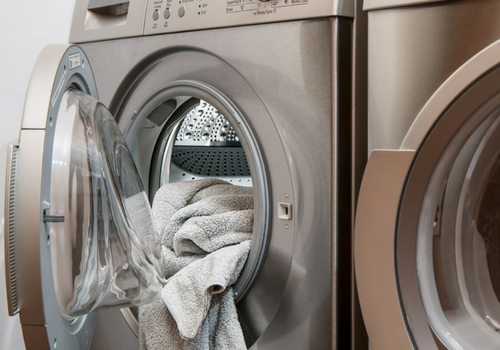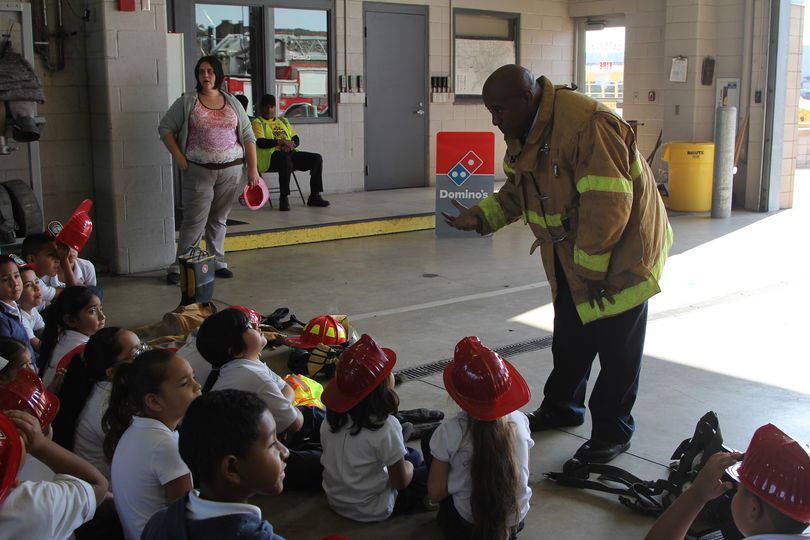Since 1922, the National Fire Protection Association (NFPA) has sponsored the public observance of Fire Prevention Week. In 1925, President Calvin Coolidge proclaimed Fire Prevention Week a national observance, making it the longest-running public health observance in our country. During Fire Prevention Week, children, adults, and teachers learn how to stay safe in case of a fire. Firefighters provide lifesaving public education in an effort to drastically decrease casualties caused by fires.
Fire Prevention Week is observed each year during the week of October 9th in commemoration of the Great Chicago Fire, which began on October 8, 1871, and caused devastating damage. This horrific conflagration killed more than 250 people, left 100,000 homeless, destroyed more than 17,400 structures, and burned more than 2,000 acres of land.
The 2020 campaign is from October 5th through 11th. The theme, “Serve Up Fire Safety in the Kitchen!TM” works to educate everyone about the simple but important actions they can take to keep themselves, and those around them, safe in the kitchen.
KITCHEN SAFETY
Did you know?
- Cooking is the #1 cause of home fires and home fire injuries.
- Unattended cooking is the leading cause of fires in the kitchen.
- Scald burns are the second leading cause of all burn injuries. Hot liquids from coffee and even microwaved soup can cause devastating injuries.
CLOTHES DRYER SAFETY
Thousands of home fires are caused each year by clothes dryers. Those fires resulted in dozens of deaths, thousands of injuries, and more than $238 million annually in property damage. The leading cause of clothes dryer fires? Improper maintenance.

5 steps to prevent clothes dryer fires:
1. Clean the lint filter in a dryer before AND after each use. The buildup of dust and lint is the No. 1 cause of dryer fires. You should clean the lint filter before and after each use and never use the dryer without a filter in place.
2. Install metal vent pipes. If you have accordion-style lint vent pipes, you should have them replaced with new metal pipes, which are less likely to trap lint build-up and are less susceptible to kinks or crushing.
3. Keep the dryer area clear of combustibles like boxes and clothing. Fire can spread extremely quickly when combustibles are nearby.
4. Do not leave a dryer running when you leave your house or go to bed. A fire can quickly become overwhelming if no one is monitoring the dryer.
5. Avoid overloading the dryer. This will lessen the risk of fire caused by leaks or broken parts.
SMALL CHILD SAFETY

Homes with small children should also add these important precautions:
1. Purchase Tot Finder stickers. These should be applied to be the windows of your children's bedrooms.
2. Stop, Drop and Roll. Teach this skill and practice until it is second nature.
3. Run toward, not away from, firefighters. Firefighters in full gear with respirators can look very scary to small children. Contact your local fire station to see if you can visit and have a firefighter show them what they will look like in their gear and talk fire safety with your kids.
4.Keep matches and lighters up high. You want matches and lighters out of the reach of curious children. Consider a cabinet with a child lock. Also teach your children never to play with matches or lighters.
OTHER SAFETY TIPS

1. Install smoke alarms on every level of your home
Did you know that roughly half of home fire deaths result from fires reported between 11 p.m. and 7 a.m., when most people are asleep? Smoke alarms save lives, but not if you can't hear them! Working smoke alarms cut the risk of dying in a home fire in half. While research shows that most U.S. homes have at least one smoke alarm, almost two-thirds of home fire deaths result from fires in homes with no smoke alarms or no working smoke alarms. Smoke alarms should be located inside every bedroom and outside sleeping areas. Interconnect smoke alarms throughout the home so that when one sounds, they all sound.
2. Test smoke alarms at least once a month
Smoke alarms can help make the difference between life and death in a fire, but they need to be working. The common presence of smoke alarms in the home tends to create a false sense of security. Simply having smoke alarms isn’t enough. They need to be tested and maintained properly. Replace conventional batteries at least once a year or when the alarm “chirps” to tell you the battery is low. Replace any smoke alarm that is more than 10 years old.
3. Have a fire extinguisher within easy reach.
There should be at least one fire extinguisher on every level in your home. Teach everyone in the house to call 911 immediately.
4. Give space heaters space
Keep fixed and portable space heaters at least three feet away from anything that can burn. Turn off heaters when you leave the room or go to sleep. Also, use extreme caution with electric blankets and heating pads.
5. Ask smokers to smoke outside
Keep sturdy, deep ashtrays for smokers and make sure they use them.
6. Inspect electrical cords
or have loose connections. Keep outlets that are not in use covered with plastic safety plugs.
7. Blow candles out when you leave a room
Candles should only be lit at least one foot from anything that can burn and should be extinguished when you leave a room or go to sleep.
8. Have a plan
Families should develop a home escape plan which includes:
- Two ways out of every room (a door and a window)
- A path from each exit to the outside
- An outside meeting place (a tree, light pole, or mailbox) within a safe distance in front of your home
- Time to practice your escape plan twice a year
"The main thing to remember is to always be aware because a fire can happen anywhere, at any time. That’s why everyone should take some precautions in order to prevent a fire, and stay safe in case of one," Miller said. "Even a small fire can be dangerous and deadly.
For more information about Fire Prevention Week and upcoming events, visit www.fpw.org



